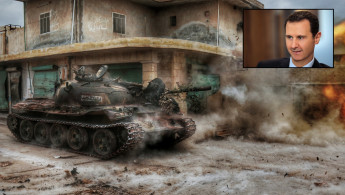No Assad in the future
Bashar al-Assad will not be ruling Syria in the future and Russia's military interventions will not help him stay in power, Saudi Arabia's Foreign Minister Adel al-Jubeir told a German newspaper in an interview published Saturday.
"There will be no Bashar al-Assad in the future," al-Jubeir told newspaper Sueddeutsche Zeitung.
"It might take three months, it might take six months or three years - but he will no longer carry responsibility for Syria. Period."
Saying that the Syrian people's determination to topple Assad was unbroken despite heavy Russian airstrikes and persecution within the country, al-Jubeir criticized Russia's involvement in the five-year-long war.
He said that Assad's previous calls for help to his own military, Iran, Hizballah and Shia militia forces from Iraq and Pakistan were all in vain.
 |
Now he called the Russians, but they won't be able to help him either --Saudi's FM on Assad |
 |
Russia entered the war on Sept. 30 2015 in support of the Syrian president. At least 250,000 people have been killed, 11 million made homeless and hundreds of thousands have fled to Europe since the conflict began in 2011.
Moscow has said its air strikes are against the extremist militant groups IS and the Nusra Front, but other countries and rebel groups say the attacks target civilians.
Asked about a more direct military involvement with "boots on the ground", al-Jubeir said such discussions were currently underway among the member states of a US-led coalition against IS.
"If the coalition should decide to deploy special forces in the fight against IS in Syria, Saudi Arabia will be ready to participate," he said.
At a peace and security conference currently underway in Munich, major powers said a peace deal could only be reached if Moscow stops bombing insurgents other than IS.
But Russia pressed on with its airstrikes in support of Assad, who vowed to fight until he regained full control of the country.
Iran-Saudi detente?
On Friday as well, Iran extended an olive branch to Saudi Arabia when the Iranian foreign minister said both countries must overcome strained relations and work for stability in Syria and the Middle East, a day after Syrian peace talks brought the rivals to the same table for the first time in months.
Speaking at the Munich Security Conference hours after his Saudi counterpart addressed the event, Zarif said he wanted to stop the bickering and had a simple message: “We need to work together.”





 Follow the Middle East's top stories in English at The New Arab on Google News
Follow the Middle East's top stories in English at The New Arab on Google News
![The UAE is widely suspected of arming the RSF militia [Getty]](/sites/default/files/styles/image_330x185/public/2024-11/GettyImages-472529908.jpg?h=69f2b9d0&itok=Yauw3YTG)
![Netanyahu furiously denounced the ICC [Getty]](/sites/default/files/styles/image_330x185/public/2024-11/GettyImages-2169352575.jpg?h=199d8c1f&itok=-vRiruf5)
![Both Hamas and the Palestinian Authority welcomed the ICC arrest warrants [Getty]](/sites/default/files/styles/image_330x185/public/2024-11/GettyImages-2178351173.jpg?h=199d8c1f&itok=TV858iVg)